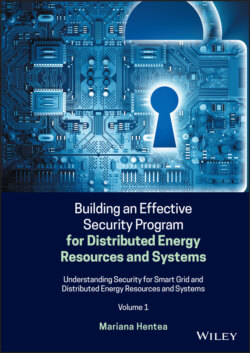Читать книгу Building an Effective Security Program for Distributed Energy Resources and Systems - Mariana Hentea - Страница 36
1.4.1.3 Security as Information Protection
ОглавлениеSecurity as information protection involves measures taken to ensure the anonymity of electronic information, both in transit and when stored on digital systems; of primary importance is information related to protecting personal information related to utility customers and information about the electric power system that may be of interest to parties who wish to harm the utility or its customers [Nordell 2012].
The four interrelated dimensions to energy security are described as physical, cyber, supply, and conflict‐related as defined in [DOE 2015a]:
Physical security risks are related to damage to energy supply, storage, and delivery infrastructures, such as the electric grid, pipeline networks, and rail and marine systems.
Cybersecurity risks are related to the compromise of ICT‐based controls that operate and coordinate energy supply, delivery, and end‐use systems.
Supply security risks are related to price shocks and international supply disruptions of energy commodities, critical materials, and/or equipment.
Conflict‐related security risks are associated with unrest in foreign countries linked to, or impacting, energy.
Therefore, multiple definitions of security need to be explored to find some common thread that can help ensure the success of the pursuit of a smarter electrical grid while maintaining security – in all of its various meanings [Nordell 2012].
Grid security and the privacy of people including consumers are of vital importance in the energy sector. If there is any compromise of the personal data or security of the power service, it can undermine everything. An incident would not only create a breach of privacy or security, but it might also compromise the potential future markets the technology might have been able to create if the service had been secure.
